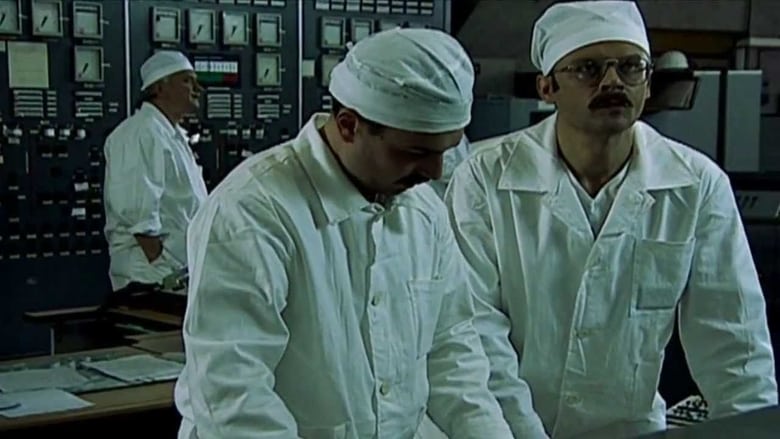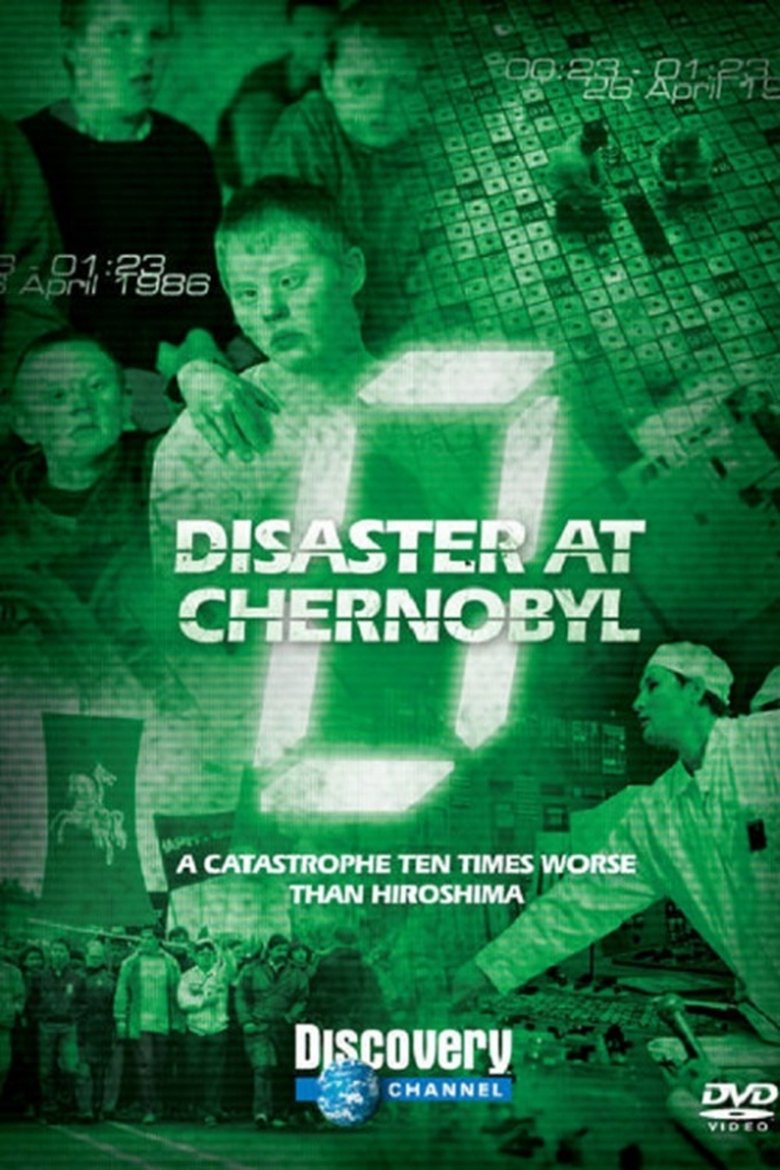Loading


Disaster at Chernobyl
A catastrophe ten times worse than Hiroshima
Genres
DocumentaryHistoryTV Movie
Overview
The explosion at Chernobyl was ten times worse than the Hiroshima bomb and was due to a combination of human error and imperfect technology. An account of the sixty critical minutes prior to the explosion of the nuclear power plant on the night of April 26, 1986.
Details
Budget
$0
Revenue
$0
Runtime
48 min
Release Date
2004-01-01
Status
Released
Original Language
English
Vote Count
13
Vote Average
7.5
Cast
Meet the talented actors who bring the movie to life.
David Morrissey
Self - Narrator (voice)
Igor Slavinskiy
Anatoli Diatlov
Aleksander Khoroshko
Alexander Akimov
Volodya Stepanenko
Leonid Toptunov
Aleksander Klimbutski
Boris Stolyarchuk
Volodymyr Holosniak
Valeri Perevozchenko
Vladimir Mamchur
Alexander 'Sasha' Yuvchenko
Irina Pavliuk
Natasha Yuvchenko
Nikita Chavinin
Kirill Yuvchenko
Vladimir Melnyk
Valeri Khodemechuk
Vladimir Velianik
Yuri Tregub
Denys Hranchak
Sasha Agulov
Vladimir Ilenko
Nicolai Fornin
Nikolai Steinberg
Self - Nuclear Physicist
Boris Stolyarchuk
Self - Chernobyl Survivor
Alexander Yuvchenko
Self - Chernobyl Survivor
Piers Paul Read
Self - Writer
Sergei Yankovsky
Self - Chernobyl Investigator
Anatoli Diatlov
Self (archive footage)
Mikhail Gorbachev
Self (archive footage)
Similar Movies
Explore movies similar to this one that you might also enjoy.
5.0
Timetravel_0
TIMETRAVEL_0 is an extraordinary docudrama that follows Cris McCarthy as she explores the urban web legend of John Titor, the man that came from the future. Cris searches for evidence of Timetravel and John Titor's predictions of a massive civil war. In the process of her filming, her work was investigated by authorities and eventually confiscated by the government. Its recent release has allowed it to be edited and produced.
2009-08-23 | en
7.9
Koyaanisqatsi
Takes us to locations all around the US and shows us the heavy toll that modern technology is having on humans and the earth. The visual tone poem contains neither dialogue nor a vocalized narration: its tone is set by the juxtaposition of images and the exceptional music by Philip Glass.
1983-04-27 | en
5.8
The Rising Hawk
During the 13th century, a small village fights for freedom in the frontier landscape of the Carpathian Mountains against Mongolian invaders.
2019-10-10 | en
6.9
The Dam Busters
The story of the conception of a new British weapon for smashing the German dams in the Ruhr industrial complex and the execution of the raid by 617 Squadron 'The Dam Busters'.
1955-05-16 | en
0.0
Custody
Using the 'real life' documentary style, this drama observes two years in the life of the Byrne family as they become involved in the complicated legal path that leads to a fully defended custody hearing in the Family Court. The Byrne family are played by actors, with real-life lawyers and members of the judiciary in the legal roles.
1988-05-18 | en
6.8
Felix Austria
The plot revolves around the controversial relationship between maid Stefania Chornenko and blueblood Adelia Anger against the backdrop of the provincial Austro-Hungary in 1900. Both Stefania’s parents and Adelia’s mother died during the fire. Adelia’s father adopted neighbors’ orphan. Girls grew up together to become as close as sisters, though Stefania served as the maid. This attachment develops into love-trap: on one hand full of mutual manipulation and jealousy, but equally based on сare and devotion. The illusion of balance is broken when Adelia marries sculptor Petro. Everything gets even more complicated when Joseph, the old love interest of Stefa, returns to town as the priest and married man. Illusions are destined to evaporate and reality comes into focus.
2020-01-16 | uk
0.0
Your Chance to Live: Pollution
A surrealistic look at the future if man does not learn to control pollution.
1973-04-30 | en
9.0
Les Cartoons bannis
2022-11-29 | fr
0.0
Anna Akhmatova (1889-1966) - Muse of Keening
A short film by Barry Lowe and Dino Mahoney, starring Pauline Burton as Anna. The film is an introduction to the great Soviet era modernist poet, Anna Akhmatova; shot in winter in Saint Petersburg (Leningrad), it contains rare interviews with people who knew her, academics, and dramatized readings of some of her poems.
2011-11-27 | en
8.0
Winter Journey
Tucson, Arizona, September 1996. At the request of his son Martin, George Goldsmith tells him of his past in Nazi Germany as a member of a family of Jewish musicians and the strange history of the Jüdischer Kulturbund, a Jewish organization sponsored by Reichsminister Joseph Goebbels.
2019-11-23 | da
0.0
The Will
Adaptation of the cult Ukrainian comic book about the alternative history of Ukraine after it's independence in 1918.
| uk
9.0
Le Fils
2024-01-23 | fr
4.8
October Days
Historical drama depicting the events leading up to the 1917 October Revolution produced to celebrate the 40th anniversary.
1958-01-01 | ru
0.0
The Illness and Recovery of Buda Brakus
The protagonists of this docudrama are old farmers who migrated to Banat after the First World War, in 1922. The film is focused on a couple of important events in their impressive lives, which are woven into lively scenes and stories full of wise instances. Their statements become spontaneous recounts of the lives of people in this region.
1980-08-25 | sh
7.0
Charlie Grant's War
A Canadian artist turned diamond merchant in Vienna, Austria risks his life to smuggle Jews out of the Third Reich.
1985-01-27 | en
6.0
Jan Hus – Cesta bez návratu
2015-11-13 | cs
7.0
Brutto Nostra
2019-10-08 | ru
7.0
Black Raven
Ukraine 1922. The Russian empire has already broken up, but a new state has not yet been formed. Many tried to create and consolidate their independence during this period, and this is the story of one of such people. This is the story of the life and love of one person - Ivan, nicknamed Raven ...
2019-12-05 | uk
4.3
The First Emperor of China
This historical drama tells the story of Qin Shihuang, who unified China's vast territory and declared himself emperor in 221 B.C. During his reign, he introduced sweeping reforms, built a vast network of roads and connected the Great Wall of China. From the grandiose inner sanctum of Emperor Qin's royal palace, to fierce battles with feudal kings, this film re-creates the glory and the terror of the Qin Dynasty, including footage of Qin's life-sized terra cotta army, constructed 2,200 years ago for his tomb.
1989-01-01 | en
7.9
Mirror
A dying man in his forties recalls his childhood, his mother, the war and personal moments that tell of and juxtapose pivotal moments in Soviet history with daily life.
1975-03-07 | ru